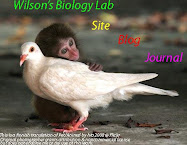by Graham and Hayes
Recently at Yale University scientist have had a breakthrough in battle against HIV/AIDS and cancer. Scientists have synthesized particles that are now able to help our body to fight prostate cancer and the HIV virus. The two particles that have been synthesized are the anitbody recruiting particle targeting HIV, (ARM-H) and the antibody recruiting molecule targeting Prostate Cancer (ARM-P). These molecules bind to antibodies and and to HIV infected-cells, proteins on HIV, or cancer cells at the same time. This calls attention to these harmful cells and proteins and the ARMs trigger our immune system to attack these. When it comes to the ARM-H, this molecule can bind onto the proteins on the outside of the HIV virus and can prevent it from infecting other cells. In the words of David Spiegel Ph. D., MD., Instead of trying to kill the pathogens directly these molecules manipulate our immune system to do something it wouldn't ordinarily do."
The fight against HIV and cancer has been long and expensive and has not resulted in many breakthroughs. Both of these diseases can be treated but the treament is often very expensive and painful. Treatments are only successful also if they are started before the disease gets to serious. However, these ARMs offer a drastic contrats. These molecules are very simple and cheap to produce and Spiegel beleives that one day they could be taken in pill form. They also do not traget larger body processes and they are more exact and localized, as opposed to chemotherapy, which hurts the entire body. This means that the side effects of these are not as bad as other treatments for HIV or cancer.
This discovery brings much hope for most people in the world, whether or not they have any connection to HIV/AIDS or Prostate Cancer. However with a discovery so ground breaking it brings much hype and controversy over its use. It is important to realize that they have just begun testing this on mice so any human tests and treatment forms are far off. Controversy is also to arise out of the question of how these drugs could be distributed. HIV/AIDS is a global pandemic that affects 33 million people worldwide and one in six of American men are expected to develop prostate cancer. However, a difference between these two diseases is that HIV/AIDS is much more prevalent in poorer communities and the developing world while prostate cancer is spread more evenly across socio-economic barriers. This raises the question of how these drugs be distributed because a large portion of the people suffering from these diseases, HIV/AIDS, in particular would not be able to afford this drug, despite its rather low cost to create. We believe that if this drug is successful there should be steps taken to give it to the people who require need it to save their lives. If and when this drug reaches the point of successfully combating HIV/AIDS and Prostate Cancer it will be one of the most valuable commodities in the world and the debate over who should have access to it will be lively.





No comments:
Post a Comment